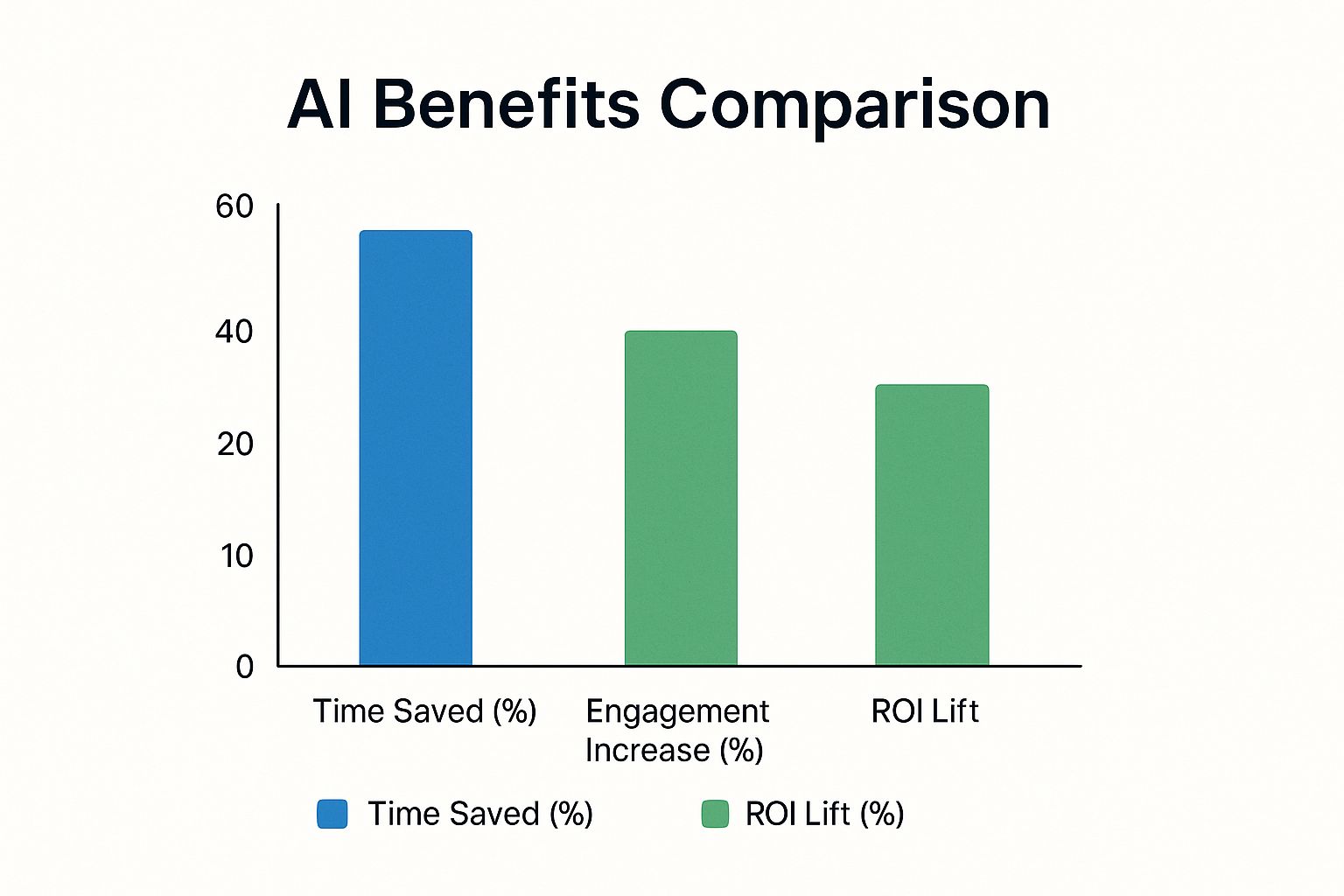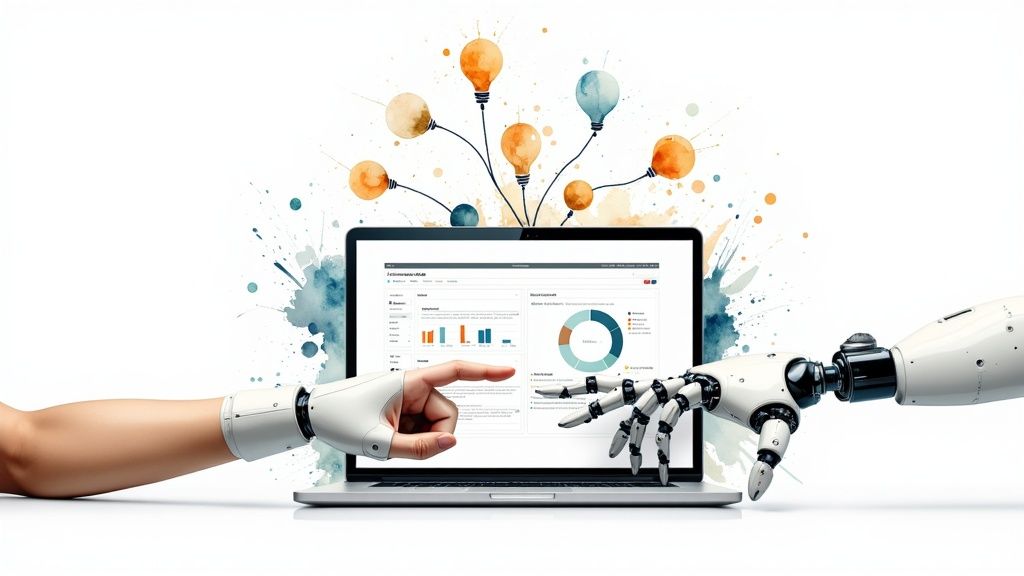Learn how AI for content marketing boosts efficiency, delivers results, and transforms your strategy. Discover actionable insights today!
In This Article
Subscribe to our newsletter
The Evolution of AI in Content Marketing
AI in content marketing has quickly become an essential tool, moving beyond its initial role in basic automation. While tasks like scheduling social media posts and automated emails offered early glimpses of improved efficiency, the true power of AI was yet to be realized. These initial steps, however, laid the groundwork for wider acceptance and deeper exploration of AI's potential in marketing.
From Automation to Content Intelligence
The emergence of content intelligence marked a significant leap forward. AI evolved beyond simple task automation to analyze data, forecast trends, and provide valuable insights into audience behavior. AI-powered tools, for example, began identifying optimal content topics and recommending effective formats and distribution channels. This shift empowered marketers to trust AI with strategic decisions, moving beyond automation to data-driven content strategies. To understand the future role of AI in customer service, check out why AI Will Be An Integral Part Of Your CS Tech Stack.
AI Accessibility and Adoption
The technological landscape has also dramatically changed. The development of user-friendly platforms and lower costs have made AI accessible to organizations of all sizes. This democratization has been key to widespread adoption, allowing even small businesses to leverage AI's power in content marketing. The increasing sophistication of AI algorithms has further improved accuracy and impact, solidifying AI’s role as a core element of modern marketing.
The Power of Combined Forces
The most effective content marketing strategies today combine AI's analytical power with human creativity. AI handles data analysis, trend prediction, and content optimization, freeing up human marketers to focus on storytelling, brand voice, and genuine audience engagement. This collaborative approach is proving more effective than relying on either AI or humans alone, driving impressive results and reshaping content marketing’s future. This growth is reflected in the broader AI market, currently valued at over $600 billion as of 2025 and projected to grow over five times its current size in the next five years. The market is expanding at a CAGR of 37.3% from 2022 to 2030. The United States, a leader in AI development, is expected to reach $299.64 billion in AI market size by 2026. This growth directly contributes to the rapid advancement and adoption of AI tools in content marketing, where 83% of companies now prioritize AI. For more detailed statistics, see this report.
Transforming Content Workflows With 93% of Marketers Using AI
AI is reshaping content marketing. Teams are using it not just to automate tasks, but to fundamentally change how they work, boosting efficiency and improving results. But how exactly are marketing teams using AI in their content operations to achieve real results?
Streamlining Content Processes With AI
Smart marketing teams are using AI to remove roadblocks at every stage of content creation. During research and ideation, AI tools quickly analyze market trends, competitor strategies, and what audiences want. This helps content creators find promising topics and build data-backed strategies. AI writing assistants can also create first drafts, headlines, and social media captions, freeing up human writers to focus on refining the message and adding creativity.
AI is especially helpful in content production. It automates time-consuming jobs like transcription, translation, and video editing with tools like Descript. This speeds up content creation and lets teams produce more without needing tons of extra resources. AI-powered tools also optimize content for search engines by suggesting keywords, improving readability, and analyzing what competitors are doing.
Optimizing and Measuring AI’s Impact
After content is created, AI helps with optimization and distribution. AI-driven analytics platforms track how content performs in real-time, giving insights into audience engagement, conversion rates, and ROI. This data lets marketers improve their strategies and maximize their content’s impact. AI can also personalize content by tailoring messages to individual user preferences, leading to higher engagement and better customer relationships. The chart below shows how AI saves time, increases engagement, and improves ROI.

As the infographic shows, AI makes a big difference in content marketing. The time saved lets teams focus on strategy, while higher engagement and ROI show how AI can drive business results. For teams looking to create more video content while keeping quality high, AI provides effective solutions. See also: Boost Growth With Automated Content Production. A striking 93% of marketers using AI in 2025 use it to create content faster. 81% use AI for quicker insights, and 90% use it to speed up decision-making, proving its value goes far beyond content creation. More statistics can be found here.
Maintaining the Human Element in AI-Driven Content Marketing
AI is clearly helpful, but it’s important to keep a balance between automation and human input. Humans are still crucial for tasks that need creativity, strategic thinking, and emotional intelligence. AI can write first drafts, but human writers are needed to refine the message, maintain brand consistency, and add a personal touch that connects with the audience. This partnership between AI and humans is the key to getting the most out of AI in content marketing. This means maintaining authentic brand voices while scaling content is both a challenge and an opportunity for today’s content teams.
To help you choose the right tool for your needs, we’ve put together a comparison table:
This table compares leading AI content tools, helping you choose the best fit for your specific needs.
AI-Powered Content Creation Tools Comparison
| Tool Name | Best For | Key Features | Pricing Model | User Skill Level |
|---|---|---|---|---|
| Jasper.ai | Long-form content, blog posts, marketing copy | AI writing templates, plagiarism checker, brand voice customization | Subscription-based | Beginner to Intermediate |
| Copy.ai | Short-form content, social media captions, ad copy | Multiple copywriting tools, collaboration features | Subscription-based | Beginner |
| Rytr | Quick content generation, blog outlines, product descriptions | Multiple language support, SEO analyzer | Subscription-based | Beginner |
| Article Forge | Long-form content, SEO articles | Bulk article generation, content scheduling | Subscription-based | Intermediate |
This table highlights some popular AI content tools and their strengths. Remember to consider your specific content needs and budget when making your decision.
Building a Data-Driven Content Strategy With AI

AI is changing the content marketing landscape. Leading content teams are now leveraging AI to analyze data, discover hidden opportunities, and build strategies grounded in real insights, moving away from guesswork and toward data-driven decisions. This allows marketers to better understand and anticipate audience needs, optimizing content for maximum impact.
Identifying Hidden Opportunities With AI
AI's ability to identify hidden opportunities is transformative. By analyzing market trends, competitor activity, and audience behavior, AI can pinpoint underserved topics and unmet needs. This empowers content teams to create highly relevant content that resonates with their target audience and fills a gap in the market.
Imagine an AI tool uncovering a surge in searches for "vegan recipes for athletes," a topic your competitors haven't addressed. This insight could spark a successful content campaign targeting this specific niche. Read also: Content Marketing Strategy Examples.
Predictive Analytics and Anticipating Audience Needs
Predictive analytics takes content strategy to the next level. AI algorithms analyze historical data and current trends to forecast future audience behavior and content needs. This allows content teams to anticipate what their audience will be searching for before the competition even catches on. This foresight provides a competitive advantage, enabling businesses to create content that captures early interest and establishes thought leadership within their industry.
Optimizing Content With Machine Learning
AI's influence extends beyond topic identification and trend prediction. Machine Learning algorithms continuously optimize content strategy by analyzing the effectiveness of different formats, distribution channels, and promotion tactics. Marketers can then fine-tune their approach, maximizing engagement and ROI.
For example, AI might reveal that video content performs significantly better than blog posts on a particular social media platform. This data-driven insight allows content teams to prioritize video creation for that channel, leading to improved campaign performance. AI can also transform content workflows by automating repetitive tasks. For more details, check out this article on AI document processing.
This shift towards data-driven decision-making is evident in the increasing adoption of AI in content marketing. In 2025, 45% of marketers are projected to use AI tools to brainstorm content ideas, and 43% are expected to automate tasks with AI software. Discover more insights about AI adoption in content marketing here.
Balancing AI and Brand Vision
While data is crucial, maintaining a balance between AI recommendations and your brand's unique vision is essential. AI should be a tool that supports and enhances your strategy, not dictates it. Successful organizations use AI to inform their decisions, ensuring that data-backed strategies align with their company values and maintain authenticity. This human oversight ensures that content remains engaging and fosters genuine connections with the audience. This balanced approach is becoming the new standard for modern content marketing.
Creating Personalized Content Experiences at Scale

Delivering personalized content to every customer is a goal many marketers strive for. With the progress in AI for content marketing, this aspiration is becoming increasingly achievable. AI doesn't replace human creativity but empowers marketers to create customized content at an unprecedented scale. Let's explore how brands are using AI to forge deeper connections with their audience segments.
How AI Powers Personalized Content
AI algorithms analyze large datasets, including user behavior, demographics, and preferences, to gain a better understanding of individual needs and interests. This allows brands to move past generic messaging and craft experiences that resonate with each individual.
For instance, an e-commerce site might use AI to track product views, additions to cart, and purchases. This data informs personalized product recommendations and targeted email campaigns, ultimately increasing the likelihood of conversions.
From Segmentation to Individualization
AI facilitates personalization at various levels. Basic audience segmentation groups users based on shared characteristics and delivers targeted content to each group. Think of a clothing retailer segmenting its audience by gender, age, or location, then showcasing relevant products and promotions to each segment.
AI goes beyond basic segmentation, enabling sophisticated individual personalization. This involves tailoring content to each user's unique preferences and behaviors, delivering highly relevant experiences. This shift toward individualization represents a significant leap forward in content marketing, fostering stronger engagement and loyalty.
Practical Examples of AI-Driven Personalization
Many brands have already embraced AI-driven personalization. Streaming services like Netflix and Spotify use AI to recommend movies, shows, and music based on individual listening and viewing histories. This tailored approach improves user experience and increases platform engagement.
Similarly, online retailers like Amazon use AI to suggest products based on browsing history, purchase patterns, and even items bought by similar users. These examples showcase the potential of AI to create truly personalized content experiences.
Ethical Considerations and Challenges
While the potential benefits are substantial, implementing AI-driven personalization raises important ethical considerations. Data privacy and security are paramount. Organizations must be transparent about data collection and usage practices, ensuring compliance with regulations and respecting user boundaries.
Maintaining a consistent brand voice across personalized experiences is also critical. While AI tailors the message, the core brand identity must remain recognizable and trustworthy.
Another key challenge is measuring true engagement beyond surface-level metrics. While personalized content often leads to increased clicks and views, true engagement involves much more. Measuring the impact of personalized experiences on customer loyalty, brand perception, and long-term value is essential for accurately evaluating the effectiveness of AI-driven strategies. Addressing these challenges requires a balanced approach that combines data utilization with ethical considerations and authentic audience connection.
Optimizing Content Distribution With AI Intelligence

Effective content distribution is crucial for online success. Even high-quality content can fall flat if it doesn't reach the intended audience. AI is revolutionizing how we distribute content, going beyond simple scheduling to offer targeted delivery and measurable results.
AI-Powered Precision Targeting
AI-powered predictive algorithms analyze data to determine the optimal channels, formats, and promotional strategies for each piece of content. This goes beyond simply finding the best time to post. This targeted approach helps marketers maximize reach and engagement. For example, AI can suggest whether a piece of content would be more effective as a blog post, video, or infographic, and recommend the ideal social media platforms for sharing.
Let's explore how AI is impacting key content marketing metrics. The following table provides a glimpse into the potential improvements:
AI Impact on Content Marketing Metrics
| Marketing Metric | Average Improvement with AI | Implementation Difficulty | Time to See Results |
|---|---|---|---|
| Website Traffic | 20-30% | Medium | 2-3 Months |
| Lead Generation | 15-25% | Medium | 1-2 Months |
| Social Media Engagement | 10-20% | Easy | 1-2 Weeks |
| Conversion Rates | 5-15% | High | 3-6 Months |
| Content Performance Prediction Accuracy | 30-50% | Medium | 2-3 Months |
This table highlights how AI can boost various marketing metrics, from website traffic to lead generation and conversion rates. While implementation difficulty and time to see results vary, the potential improvements are substantial. It underscores the effectiveness of incorporating AI into your content marketing strategy.
Identifying New Audience Segments and Opportunities
Leading brands utilize AI to uncover hidden audience segments and distribution opportunities. AI algorithms analyze large datasets to reveal patterns and correlations that traditional analytics might miss. This allows marketers to expand their reach and connect with potential customers they hadn't previously considered, tailoring content distribution to niche markets. Learn more about reaching new audiences through video: How to Master Social Media Video Best Practices.
Practical Implementation of AI for Content Distribution
Implementing AI for content distribution can range from simple automation to advanced cross-channel optimization. Basic tools can automate scheduling and posting across multiple platforms. More advanced systems utilize machine learning to constantly optimize distribution based on performance data. This continuous feedback loop ensures ongoing improvement and more effective content promotion.
From Automation to Continuous Improvement
AI's ability to learn and adapt is key for content distribution optimization. As AI systems gather more data, they improve their ability to predict the most effective distribution strategies. This continuous improvement allows businesses to refine their approach over time, maximizing the impact of their content marketing efforts.
Integrating AI Into Your Content Marketing Team
Bringing AI into your content marketing team isn't just about buying the newest tools. It's about a strategic shift, blending technology with the human touch. Teams often have valid questions about AI, from necessary skills to its impact on their roles.
Addressing Team Concerns and Building Confidence
Job displacement is a significant concern. However, AI’s strength lies in augmenting human skills, not replacing them. Think of AI as a teammate, not a replacement. For example, AI can handle repetitive tasks like data analysis and initial drafts, freeing up your team for strategy, creative development, and nuanced brand storytelling.
Another hurdle is the lack of AI skills within the team. Practical training is the answer. This could be training on specific AI tools for content marketing or workshops on using AI for content strategy. The goal is to empower your team to confidently use AI, maximizing its impact on existing workflows.
Identifying Tasks for AI Assistance vs. Human Expertise
Successful AI integration hinges on understanding which tasks benefit most from AI and which require human expertise. AI shines at keyword research, content optimization, and performance analysis. But crafting compelling stories or building an authentic brand voice – tasks requiring creativity and emotional intelligence – remain distinctly human.
Adapting Team Structure and Workflows
Integrating AI often means adjusting team structure and workflows. This might mean new roles focused on AI management and data analysis or restructuring existing teams to include AI tools in their processes. The focus should be on collaboration between humans and AI, maximizing efficiency and creative output. Picture writers partnering with AI to generate initial drafts, giving them more time to refine the messaging and add creative flair.
Change Management Strategies for Successful Implementation
Introducing AI needs a thoughtful change management approach. Open communication is crucial for addressing concerns and getting team buy-in. Regular meetings to discuss AI implementation, opportunities for feedback, and showcasing AI’s positive impact on productivity and campaign performance are all beneficial. Navigating these changes well fosters innovation and collaboration, letting your team unlock AI’s full potential. This collaborative approach – combining human creativity with AI's power – is key for a successful AI-driven content marketing strategy. It ensures AI boosts human capabilities without diminishing the crucial role of human creativity and strategy.
The Future of AI for Content Marketing
AI is rapidly changing the world of content marketing. What lies ahead? This section explores emerging technologies poised to reshape how we create, distribute, and evaluate content effectiveness. We'll examine how advancements in Natural Language Processing (NLP), Multimodal AI, and Predictive Analytics will unlock new possibilities for content experiences.
Advancements in Natural Language Processing (NLP)
Current AI tools are impressive, but they sometimes struggle with nuance and context. Future NLP advancements promise more sophisticated content creation. Imagine AI that can grasp complex arguments, craft persuasive narratives with emotional depth, and adapt its writing style to perfectly mirror a brand's voice. This means creating highly personalized content at scale will become significantly easier.
The Rise of Multimodal AI
Multimodal AI, combining text, images, video, and audio, is another exciting development. This means AI could develop entire marketing campaigns, including blog posts, social media graphics, and even video scripts, all working in perfect harmony. Think of an AI that not only writes a blog post but also designs accompanying visuals and produces a short promotional video, all while adhering to your brand guidelines.
Predictive Analytics and Content Strategy
Predictive analytics will become increasingly important. AI will go beyond simply identifying trends to forecasting audience behavior with greater precision. This will enable businesses to anticipate market shifts and create content perfectly timed to capture emerging interest. Imagine AI predicting what your audience will want to read next month, or next year, empowering proactive content creation that keeps your business ahead of the curve.
Essential Skills for the Future of AI in Content Marketing
As AI takes on more tasks, certain human skills will become even more crucial. Strategic thinking, creative problem-solving, and a deep understanding of human psychology will be essential for marketers who want to guide and maximize AI's potential. This shift underscores the importance of human oversight in ensuring AI-driven strategies remain aligned with brand values and resonate authentically with the target audience.
Ethical Considerations and Responsible AI Adoption
Ethical AI adoption and responsible data practices are paramount as these technologies advance. Transparency in data collection and usage, addressing potential biases in algorithms, and ensuring user privacy will be essential for building trust and maintaining ethical standards. These considerations highlight the need for a human-centered approach to AI implementation, balancing technological progress with ethical considerations and responsible data management. By prioritizing these values, businesses can harness the power of AI while upholding ethical principles and fostering trust with their audience.
Ready to transform your content marketing with the power of AI? Aeon, an AI-powered video creation platform, empowers publishers to create engaging video content efficiently. Learn more about Aeon and how it can transform your content strategy.


.jpg)